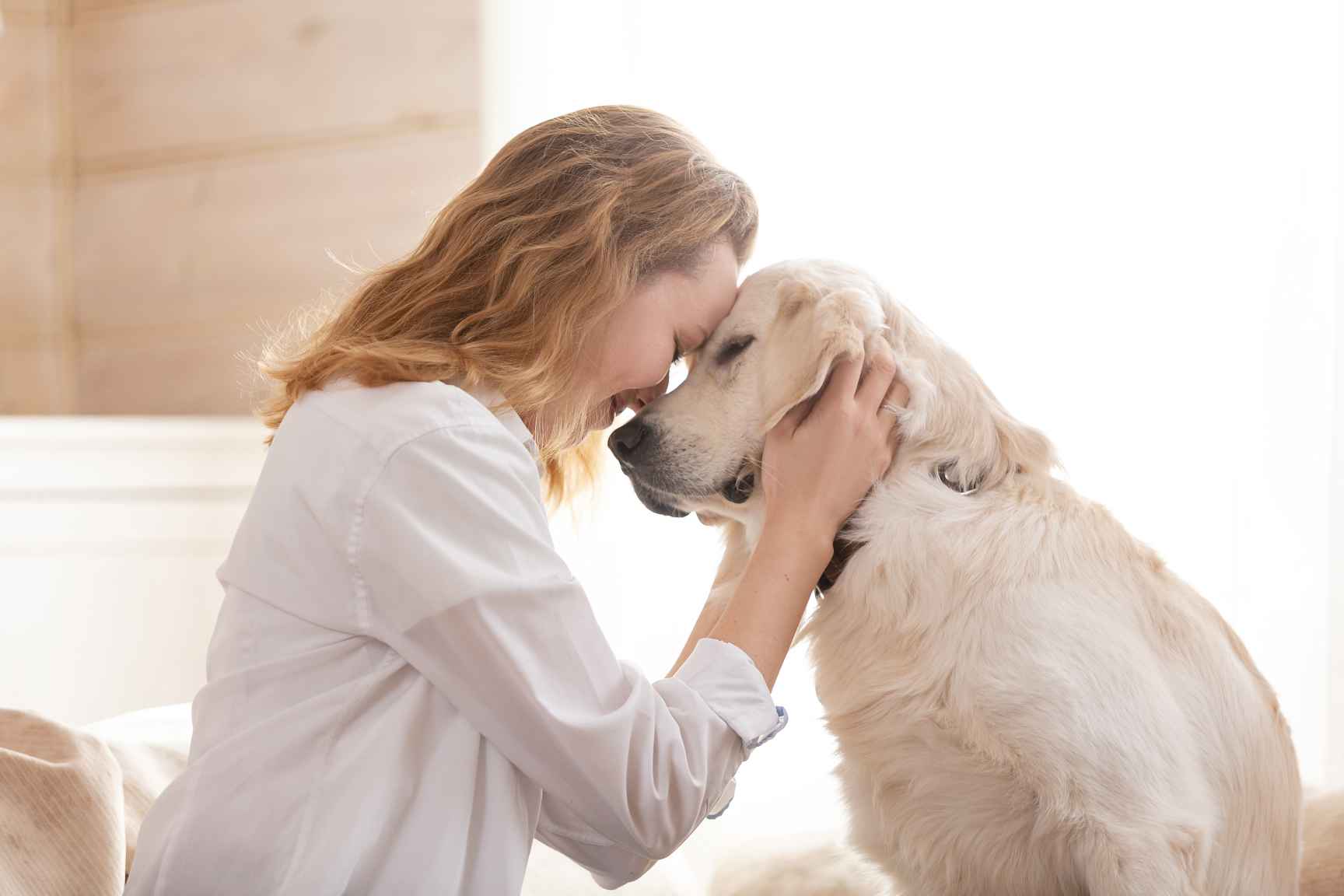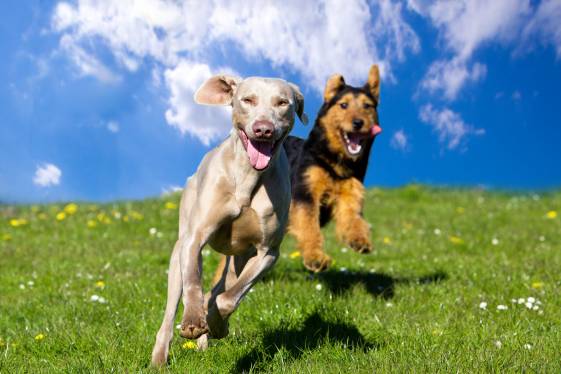Will a dog starve itself to death? That’s a good question and one that’s very difficult to answer. Well, we do know one thing for certain, and that is a dog will not starve itself to death on purpose. That’s clear; however, there are some situations where a dog may quit eating.
Connect with a verified veterinarian in minutes. Licensed vets are available 24/7 to answer your questions. No need to worry about your furry family member.
Just as with us, some dogs are always happy to see a bowl of food set down in them. They dig in with relish and eat until everything’s gone. Then there are other dogs who could care less about the food. They may nibble at the food in their bowl throughout the day, completely happy and satisfied.
It’s clear that dogs must eat to survive, and there are problems if a dog stops eating. It’s also clear that a dog will not purposely starve itself unless there’s an underlying medical problem.
Dogs Can Go About 2 Days Before Feeling Hungry
Dogs are able to go about two days without eating, though they will need water during this time. Some dogs may not even feel hungry for up to 48 hours after eating a normal meal. By then, they’re happy to eat.
However, dogs that have health issues may take longer to become hungry after a normal meal. In this case, the dog’s hunger (or lack of) is regulated by an underlying medical problem.
No matter, what it’s always a concern when a dog goes without eating for 24 hours. This is when it’s time to call the vet.
Has Your Dog Really Stopped Eating?
What happens if your dog has stopped eating but isn’t losing weight? Pay close attention because if your dog’s not losing weight, then they must be getting food somewhere else. This could be from the trash or from another person. Either way, this could be bad for the dog’s health.
For one thing, eating out of the trash can be harmful. Your dog could be exposed to all kinds of pathogens in the trash. This can include bacteria, viruses, and more such as food poisoning, which can be deadly. And someone else giving your dog food that’s low-quality could also lead to some major health issues. As the pet parent, you’re responsible for your dog’s well-being. So, it’s important to find out what’s going on. If your dog’s not losing weight, not eating the food you give him, then he’s getting food somewhere else.

Review symptoms, medications & behavior to keep your pets healthy with a Vet Online in just minutes.
Ask a Vet Live NowOther Reasons Your Dog Isn’t Eating
So, we’ve seen that a dog will not really starve himself to death. However, are there other reasons your dog may not be eating?
Medical Problems
If your canine companion has been eating all along and then suddenly stops, there could be a reason. There are some medical conditions that can make a dog not want to eat. If your dog stops eating, you may also see them have other symptoms such as diarrhea, vomiting, lethargy, and weight loss.
There are a number of illnesses that can cause these types of symptoms. This can include cancer, thyroid disease, and more. So, if your fur baby starts to show these symptoms, then it’s time to get him checked out with the vet.
In some cases, the vet may prescribe a new diet, medications, and supplements to increase your dog’s appetite. It may be that your dog just needs an adjustment on his current medications, too. Just be sure to have him checked out as soon as possible.
Stress
Some dogs are extremely sensitive to stress. The stress may be positive or negative—even happy stress can cause a sensitive dog to be off their food. Most dogs are sensitive to changes in their lives. And some will not do well when their routine is interrupted. All of these things can make a dog not want to eat.
If your dog has stopped eating, he may also show some of these other signs he’s upset due to stress:
Retreating: a normally active dog, who likes to be the center of everything, may withdraw or hide in a place that feels more safe and secure.
Changes in eating habits: this may include not eating; however, it can also include digestive issues such as vomiting or even diarrhea.
Sleeping too much: just like us, dogs can become depressed and then start sleeping too much. This is a coping mechanism—a way to escape that stress that’s so upsetting.
Destructive behavior: some dogs may show they’re stressed through destructive behavior. If your dog is acting out his stress in this way, you may come home to a chewed-up sofa and more. If a dog has a lot of pent-up stress, they will become quite destructive.
Hard eyes & frozen posture: this is a very strong signal that a dog is stressed out to the max. These indicate your dog is extremely stressed and is about to explode. At this point, your dog needs to relax before you or anyone else goes near them. In this instance, allowing your dog to retreat to a place where they feel safe is the best option.
Spoiled Dog Food
Did you know that spoiled dog food could even make your dog not eat? It’s true! In fact, your fur baby could even develop food poisoning from eating bad food. However, many people believe dogs are able to eat whatever since canines are famous for eating just about anything and everything. Even so, they can become quite sick from spoiled food.
Not only can dogs become sick from eating spoiled food, but they can also develop a condition called “garbage gut.” This can be caused by eating too much rich food, kitchen scraps, and more. The result is usually nausea, vomiting, and diarrhea that may last a day or so.
Another problem dogs can develop is called pancreatitis, which can be fatal. This is caused when a dog eats foods that a high in fats.
For these reasons, it’s always a good idea to use a wastebasket that has a dog-proof lid. It’s a great idea to store your fur baby’s food in an air-tight container to keep out moisture, mold, and insects. And remember to check the expiration date on your fur baby’s food.
How to Get Your Dog to Eat Again
The first thing to do if your dog’s stopped eating is to call the vet and make an appointment. It’s time for your fur baby to get a checkup. There could be an underlying health issue that’s causing your dog’s loss of appetite. It may not be anything too serious; just, your fur baby’s off a little bit. A new medication, tweaking his current meds, or changing his diet could perk up his appetite again.
Here Are Some Things to Try if Your Dog Seems Otherwise OK
If your fur baby just seems a little off and isn’t showing any symptoms (such as diarrhea, vomiting, etc.), then you might try adding something yummy to his food like:
Pure Wild Alaskan Salmon Oil for Dogs: this is a great treat for dogs (and cats), which is flavored with wild Alaskan salmon. This is a natural fish oil additive supplement that works to support your fur baby’s skin, coat, hips, joints, heart, and immune system. Plus, this is a taste dogs are sure to love!
Blue Buffalo Wilderness Trail Toppers Wild Cuts Dog Gravy Snacks: these are gravy packets that can easily be added to your dog’s regular dog food. Your canine companion may just need his food perked up a little bit! These toppers contain no corn, wheat, soy, artificial flavors, colors, or preservatives.
Another option is to try a higher-quality dog food. This might encourage your canine companion to eat better.
Cut Back on Treats
Do you have a habit of sharing your meals and snacks with your dog? This could have a huge impact on his appetite! Dogs love table scraps and human food of all kinds! However, it’s not always the best or healthiest option for them. So, if your dog isn’t eating his dog food, consider how often you share a snack with him.
Another thing to consider is how many dog treats your dog has each day. If your fur baby is getting too many treats, he won’t be hungry enough to eat his regular dog food.
Feed Your Dog on a Schedule
Some dogs, just like us, eat much better on a regular schedule. Most experts recommend that dogs eat two meals per day about 12 hours apart. Longer in-between meals can lead to an acidic stomach, which can keep some dogs from eating.
But each dog is unique, so you’ll need to find what works best for your fur baby. Even so, eating on a regular schedule may help your dog have a better appetite.
More Exercise
If your dog is otherwise healthy, getting him to exercise more could spur his hunger! Before increasing your dog’s exercise level, it’s a good idea to visit the vet. They can give your fur baby a physical exam to make sure he’s ready for more exercise. The vet can also guide you on how to increase your dog’s activity levels.
Just like us, a dog who hasn’t been very active will need to build up stamina and strength gradually. This applies even to longer walks than the dog may be used to. So, be sure to follow the vet’s guidance and advice on how to get your fur baby more active gradually and safely.
There you have it! Dogs can be fussy eaters, just like us; however, they will not starve themselves. If your dog has stopped eating suddenly and has other concerning symptoms, then it’s a good time to call the vet. A checkup can put your mind at rest, and the vet may also have some great tips to get your dog eating once again!
Connect with a verified veterinarian in minutes. Licensed vets are available 24/7 to answer your questions. No need to worry about your furry family member.

Kyoko
Kyoko is from a family of 3 and moved to New York with her parents and siblings when she was 13. Kyoko is fond of spending a great amount of time with pets, specifically her beagle Luna and cat Missy. Her boyfriend often complains that she spends too much time giving attention to their animals. Kyoko has written dozens of articles concerning pets and is aiming at owning a pet shop one day!
Review symptoms, medications & behavior to keep your pets healthy with a Vet Online in just minutes.
Ask a Vet Live Now



